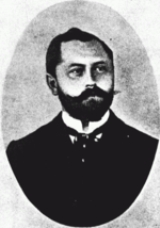
Fritz Schaudinn
Encyclopedia
Fritz Richard Schaudinn (19 September 1871 – 22 June 1906) was a German zoologist
Born in Röseningken, East Prussia
, he co-discovered, with Erich Hoffmann
in 1905, the causative agent of syphilis
, Spirochaeta pallida (also known as Treponema pallidum). The work was carried out at the Berlin Charité
.
Among Schaudinn's other contributions to medicine include his work in the field of amoebic dysentery
and sleeping sickness, his confirmation of the work of Sir Ronald Ross
and Giovanni Battista Grassi
(1854-1925) in the field of malaria
research. He also demonstrated that human hookworm
infection is contracted through the skin of the feet. He made noted contributions to zoology and was one of the developers of protozoology as an experimental science. Schaudinn was a graduate in zoology of the Friedrich Wilhelm University in Berlin
. Since 2002 an annual medical prize has been awarded in his name.
Schaudinn died during his journey back to Germany from an International Medicine Meeting in Lisbon, when he underwent an urgent surgery aboard due to gastrointestinal amebian
abscess
es. Such amebian infection had probably been voluntarily acquired when he did research on amoebas. Schaudinn was a little under 35 years of age when he died in Hamburg
.
Zoology
Zoology |zoölogy]]), is the branch of biology that relates to the animal kingdom, including the structure, embryology, evolution, classification, habits, and distribution of all animals, both living and extinct...
Born in Röseningken, East Prussia
East Prussia
East Prussia is the main part of the region of Prussia along the southeastern Baltic Coast from the 13th century to the end of World War II in May 1945. From 1772–1829 and 1878–1945, the Province of East Prussia was part of the German state of Prussia. The capital city was Königsberg.East Prussia...
, he co-discovered, with Erich Hoffmann
Erich Hoffmann
Erich Hoffmann was a German dermatologist who was a native of Witzmitz, Pomerania. He studied medicine at the Berlin Military Academy, and was later a professor at the Universities of Halle and Bonn....
in 1905, the causative agent of syphilis
Syphilis
Syphilis is a sexually transmitted infection caused by the spirochete bacterium Treponema pallidum subspecies pallidum. The primary route of transmission is through sexual contact; however, it may also be transmitted from mother to fetus during pregnancy or at birth, resulting in congenital syphilis...
, Spirochaeta pallida (also known as Treponema pallidum). The work was carried out at the Berlin Charité
Charité
The Charité - Universitätsmedizin Berlin is the medical school for both the Humboldt University and the Free University of Berlin. After the merger with their fourth campus in 2003, the Charité is one of the largest university hospitals in Europe....
.
Among Schaudinn's other contributions to medicine include his work in the field of amoebic dysentery
Dysentery
Dysentery is an inflammatory disorder of the intestine, especially of the colon, that results in severe diarrhea containing mucus and/or blood in the faeces with fever and abdominal pain. If left untreated, dysentery can be fatal.There are differences between dysentery and normal bloody diarrhoea...
and sleeping sickness, his confirmation of the work of Sir Ronald Ross
Ronald Ross
Sir Ronald Ross KCB FRS was a British doctor who received the Nobel Prize for Physiology or Medicine in 1902 for his work on malaria. He was the first Indian-born person to win a Nobel Prize...
and Giovanni Battista Grassi
Giovanni Battista Grassi
Giovanni Battista Grassi was an Italian zoologist, known for work demonstrating that mosquitos carry the malaria parasite Plasmodium in their digestive tract, on the embryological development of honey bees, on parasites, particularly the vine parasite phylloxera, migrations and metamorphosis in...
(1854-1925) in the field of malaria
Malaria
Malaria is a mosquito-borne infectious disease of humans and other animals caused by eukaryotic protists of the genus Plasmodium. The disease results from the multiplication of Plasmodium parasites within red blood cells, causing symptoms that typically include fever and headache, in severe cases...
research. He also demonstrated that human hookworm
Hookworm
The hookworm is a parasitic nematode that lives in the small intestine of its host, which may be a mammal such as a dog, cat, or human. Two species of hookworms commonly infect humans, Ancylostoma duodenale and Necator americanus. A. duodenale predominates in the Middle East, North Africa, India...
infection is contracted through the skin of the feet. He made noted contributions to zoology and was one of the developers of protozoology as an experimental science. Schaudinn was a graduate in zoology of the Friedrich Wilhelm University in Berlin
Berlin
Berlin is the capital city of Germany and is one of the 16 states of Germany. With a population of 3.45 million people, Berlin is Germany's largest city. It is the second most populous city proper and the seventh most populous urban area in the European Union...
. Since 2002 an annual medical prize has been awarded in his name.
Schaudinn died during his journey back to Germany from an International Medicine Meeting in Lisbon, when he underwent an urgent surgery aboard due to gastrointestinal amebian
Amoeba
Amoeba is a genus of Protozoa.History=The amoeba was first discovered by August Johann Rösel von Rosenhof in 1757. Early naturalists referred to Amoeba as the Proteus animalcule after the Greek god Proteus, who could change his shape...
abscess
Abscess
An abscess is a collection of pus that has accumulated in a cavity formed by the tissue in which the pus resides due to an infectious process or other foreign materials...
es. Such amebian infection had probably been voluntarily acquired when he did research on amoebas. Schaudinn was a little under 35 years of age when he died in Hamburg
Hamburg
-History:The first historic name for the city was, according to Claudius Ptolemy's reports, Treva.But the city takes its modern name, Hamburg, from the first permanent building on the site, a castle whose construction was ordered by the Emperor Charlemagne in AD 808...
.

